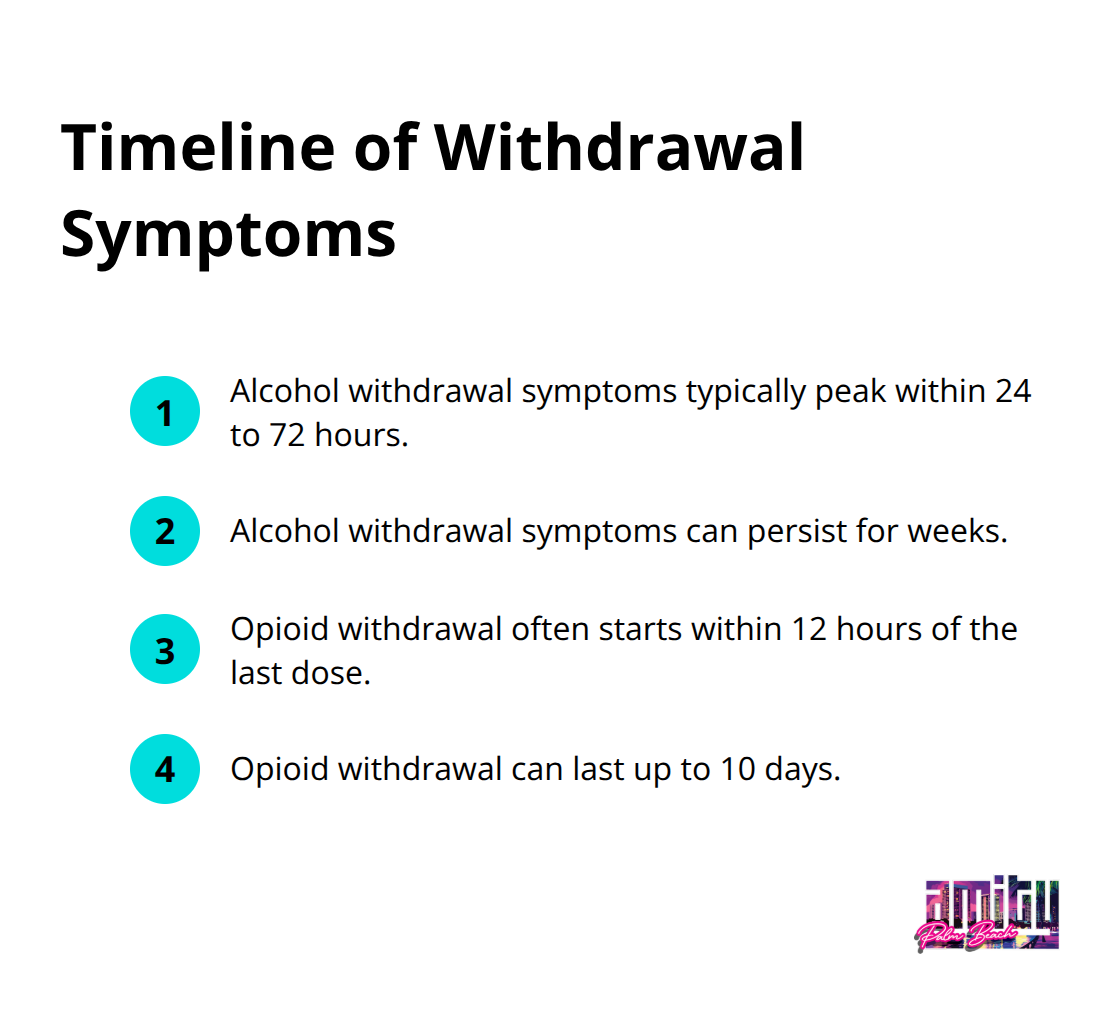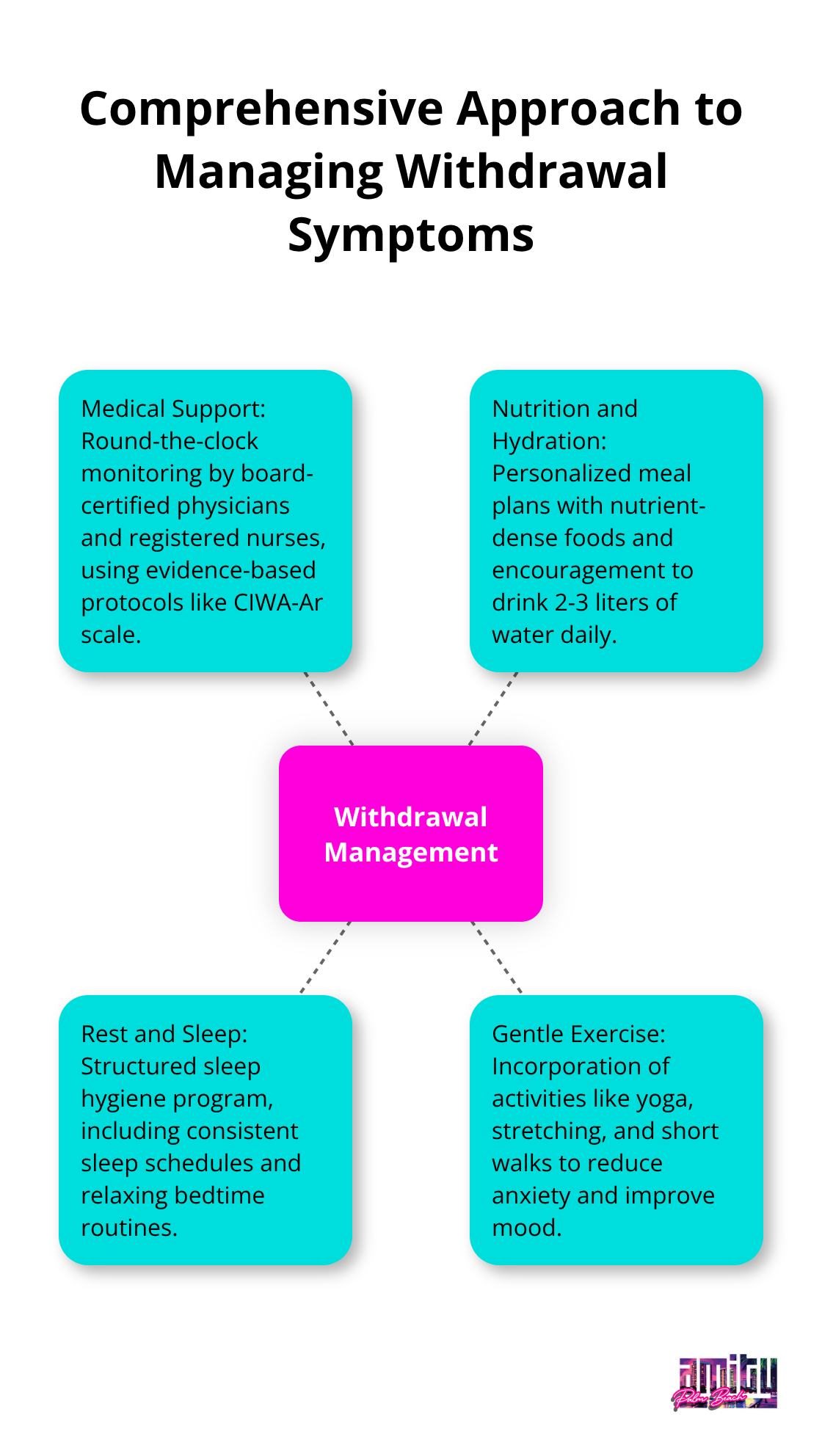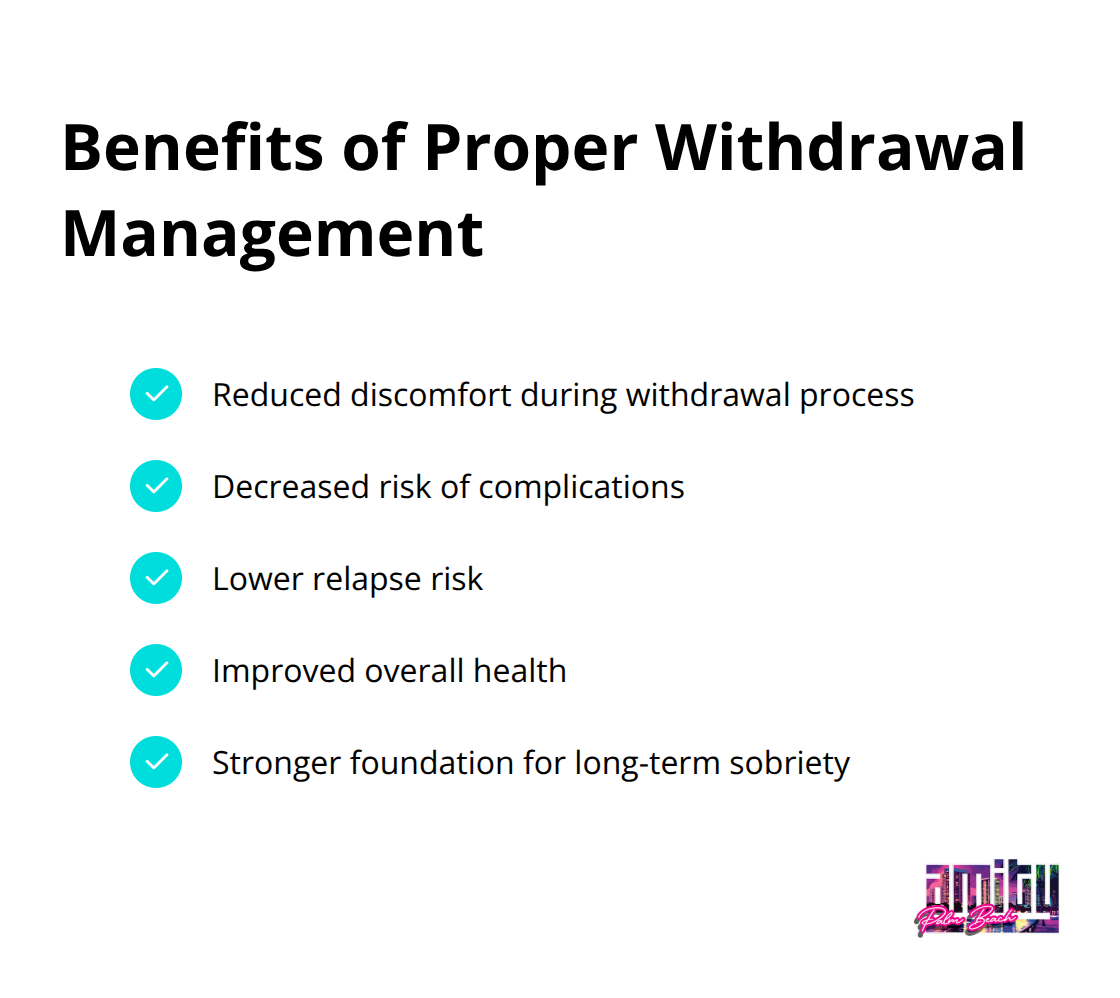At Amity Palm Beach, we understand that managing withdrawal symptoms can be a challenging part of the recovery journey.
Withdrawal symptoms can vary widely, from physical discomfort to psychological distress, making the process daunting for many individuals seeking sobriety.
In this guide, we’ll share expert tips and strategies to help you navigate this crucial phase more comfortably and effectively.
What Happens During Withdrawal?
Withdrawal affects both the body and mind in complex ways. Understanding this process can significantly improve recovery outcomes.
Physical Symptoms of Withdrawal
Many illicit drugs and chemicals, including medications, produce withdrawal symptoms when their use is discontinued. Alcohol withdrawal often leads to sweating, tremors, and nausea. Opioid withdrawal typically results in muscle aches, vomiting, and diarrhea. Benzodiazepine withdrawal can trigger seizures in severe cases.
Psychological Impact of Withdrawal
Withdrawal doesn’t limit its effects to the body; it also takes a toll on mental health. Patients in withdrawal may be feeling anxious or scared. Offering accurate, realistic information about drugs and withdrawal symptoms can help alleviate anxiety.
Timeline of Withdrawal
The duration and intensity of withdrawal symptoms depend on the substance used, length of use, and individual factors. Alcohol withdrawal symptoms typically peak within 24 to 72 hours but can persist for weeks. Opioid withdrawal often starts within 12 hours of the last dose and can last up to 10 days.

Many treatment centers (including Amity Palm Beach) use the Clinical Institute Withdrawal Assessment for Alcohol (CIWA-Ar) scale to assess and monitor alcohol withdrawal symptoms. This tool helps provide targeted care and medication management when necessary.
The Role of Professional Support
Professional support plays a vital role in managing withdrawal effectively. It’s not just about enduring discomfort; it’s about managing symptoms to prevent complications and reduce relapse risk. Medical professionals can provide:
- Medication management to alleviate severe symptoms
- 24/7 monitoring to ensure safety
- Psychological support to address mental health concerns
The next phase of recovery focuses on developing strategies to manage withdrawal symptoms effectively, setting the foundation for long-term sobriety.
How to Effectively Manage Withdrawal Symptoms
At Amity Palm Beach, we have developed a comprehensive approach to manage withdrawal symptoms. Our strategies stem from years of experience and the latest research in addiction treatment. Here’s what we find most effective:
Medical Support: The Foundation of Safe Withdrawal
Medical supervision forms the cornerstone of safe withdrawal. When you’re ready to break free from addiction, medically supervised detox is a critical first step. Our team of board-certified physicians and registered nurses provide round-the-clock monitoring at an acute detox center. This allows us to address any complications quickly.
We use evidence-based protocols like the Clinical Institute Withdrawal Assessment for Alcohol (CIWA-Ar) scale to assess and manage symptoms. This tool helps us tailor medication dosages to each patient’s needs, minimizing discomfort while ensuring safety.
In some cases, we use medications to ease withdrawal symptoms. For example, benzodiazepines can help manage alcohol withdrawal, while buprenorphine can alleviate opioid withdrawal symptoms. However, we always carefully weigh the benefits against potential risks.

Nutrition and Hydration: Fueling Recovery
Proper nutrition and hydration often get overlooked in withdrawal management. A balanced diet supports physical and emotional recovery during the detox process. Many patients arrive malnourished due to long-term substance abuse. We address this by providing nutrient-dense meals and encouraging regular fluid intake.
Our dietitians create personalized meal plans that support the body’s healing process. We often recommend foods rich in B vitamins (which can help reduce anxiety and improve mood). Staying hydrated is equally important – we encourage patients to drink at least 2-3 liters of water daily.
Rest and Sleep: Allowing the Body to Heal
Quality sleep is essential for managing withdrawal symptoms and supporting overall recovery. However, many patients struggle with insomnia during this phase. We implement a structured sleep hygiene program to address this issue.
This program includes maintaining a consistent sleep schedule, creating a relaxing bedtime routine, and limiting screen time before bed. In some cases, we may use non-addictive sleep aids to help patients establish healthy sleep patterns.
Gentle Exercise: Moving Towards Wellness
While intense exercise isn’t recommended during acute withdrawal, gentle movement can benefit patients. We incorporate activities like yoga, stretching, and short walks into our treatment programs. These activities can help reduce anxiety, improve mood, and alleviate some physical symptoms of alcohol withdrawal.
The next chapter will explore holistic approaches that complement these strategies, providing a well-rounded approach to easing withdrawal discomfort and supporting long-term recovery.
Holistic Healing for Withdrawal
At Amity Palm Beach, we believe in a comprehensive approach to managing withdrawal symptoms. While medical support forms the foundation, holistic therapies can significantly enhance comfort and promote overall well-being during this challenging phase.
Mindfulness: A Powerful Tool for Symptom Management
Mindfulness-based interventions show promising results in easing withdrawal discomfort. A recent randomized clinical trial examined the effect of mindfulness training in adults receiving buprenorphine for opioid use disorder. We incorporate daily guided meditation sessions into our treatment programs, teaching patients to observe their thoughts and sensations without judgment.
One effective technique we use is the body scan meditation. This practice involves systematically focusing attention on different parts of the body, helping patients become aware of physical sensations associated with withdrawal. Many report reduced muscle tension and improved sleep quality after regular practice.
Acupuncture: Ancient Wisdom for Modern Recovery
Acupuncture, an ancient Chinese healing practice, has gained recognition in addiction treatment. The National Acupuncture Detoxification Association (NADA) auriculotherapy protocol has been widely adopted in recovery centers across the United States.
While the NADA protocol may not be scientifically demonstrably effective for reducing acute opiate craving or withdrawal, it may facilitate treatment engagement. Many patients report improved mood after these treatments.
Natural Remedies: Supporting the Body’s Healing Process
While not a substitute for medical care, certain natural remedies can complement withdrawal management. For example, ginger tea can help alleviate nausea, a common withdrawal symptom. Chamomile tea may promote relaxation and improve sleep quality.
Specific supplements under medical supervision can also be beneficial. However, it’s important to note that even natural remedies can interact with medications or have side effects. Always consult with a healthcare provider before starting any new supplement regimen during withdrawal.
The Power of Connection: Support Groups and Therapy
Human connection plays a vital role in easing the emotional distress of withdrawal. Daily group therapy sessions allow patients to share experiences and coping strategies. These sessions not only provide emotional support but also help patients develop social skills for long-term recovery.
Individual therapy sessions with licensed counselors allow for deeper exploration of personal issues that may have contributed to substance use. Cognitive Behavioral Therapy (CBT) has proven particularly effective in managing withdrawal symptoms and preventing relapse.
Final Thoughts
Professional support plays a key role in managing withdrawal symptoms effectively. At Amity Palm Beach, we provide comprehensive care to help individuals navigate this challenging phase of recovery. Our approach combines medical supervision, holistic therapies, and personalized treatment plans to address the complex nature of addiction.
Withdrawal symptoms can be difficult, but they are temporary. With the right strategies and support, you can overcome this phase and build a strong foundation for long-term sobriety. The benefits of proper withdrawal management extend beyond immediate relief, including reduced relapse risk and improved overall health.

If you or a loved one struggles with addiction, professional help is available. Amity Palm Beach offers evidence-based treatment programs tailored to individual needs (including management of withdrawal symptoms). Our experienced team stands ready to support you through every step of your recovery journey.




